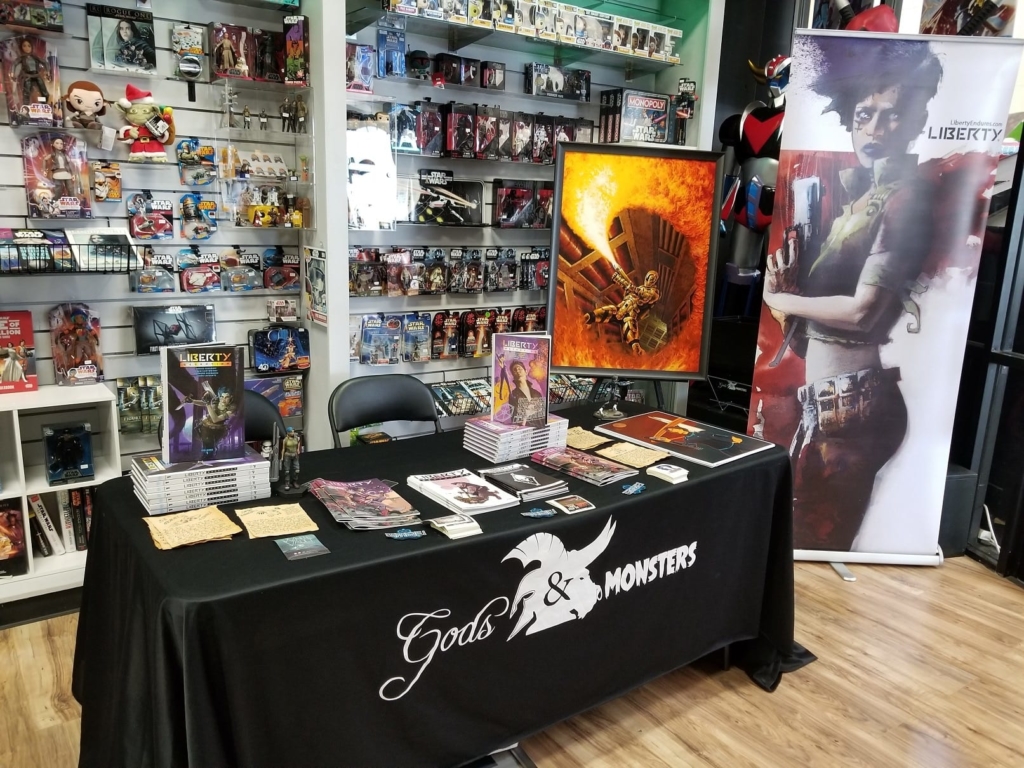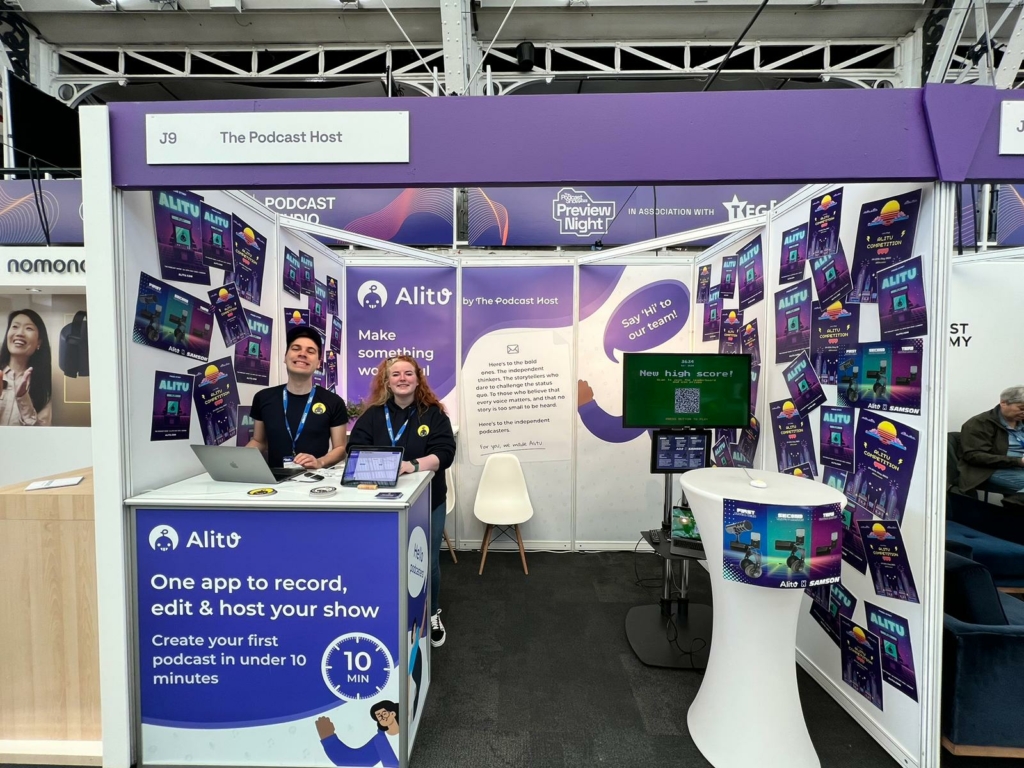How To Run Your Podcast Booth For Events: Expert Tips & Tactics
Is renting a booth to promote your podcast at a convention worth it?
On the one hand, conventions can be a great way to promote your show, sell related merchandise, and build relationships.
But, conventions can be expensive, time-consuming, and physically exhausting.
Participation with a podcast booth can give you and your fans a home base, but it’s a responsibility.
I spoke with some experienced convention-goers who are good at promoting their work through a podcast booth. Overall, they said podcasters need to plan ahead, simplify their booth setup and goals, and avoid taking things too seriously.
But there’s a lot more to it than that. Let’s dig into the details of how to get the most out of your podcast booth experience…
What Kind of Convention?
Are you going to a convention centered around a topic that your podcast covers, or a podcast convention? For example, are you attending a gardening convention to promote your gardening podcast? Or, will you be a podcaster in a sea of podcasters?
In the case of the former, it’s easy to stand out from the other convention booths. When you’re a podcaster among other podcasters, showing your individuality takes more effort. And, you might want to spend time attending seminars or networking events.
For the purposes of this article, I’ll focus on running your booth for podcast conventions, since it’s more challenging.
Know Your Goals Before You Go.
Before you leave home, think of one or two things that you want to make sure you do at the podcasting convention. Conventions can be crowded, busy, and overstimulating. Don’t lose sight of your purpose and needs.
At a podcast convention, you can learn some skills, meet other podcasters, and build relationships for cross-marketing. Check the schedule to learn about the speakers and panels at the convention. If you plan to attend multiple sessions, you may not want to run a podcast booth. Or, bring a podcasting friend and take turns running the booth.
You should also determine whether this is an industry convention (for podcast creators) or a fan convention (catering to audiences). This affects what you can gain from the experience and what contribution is welcome.
As Sean Howard, co-founder of Fable & Folly and founder of Flightpath, said, “Know the difference between an industry convention and a fan convention. Industry conventions are where you want to walk the floor, go to sessions, and meet other producers, agents, etc. Fan conventions are where you can move a lot of merchandise and reach new audiences.”
Travis Vengroff of Fool & Scholar Productions, said, “As a podcaster at a business event, the goal of making money or gaining a large number of new listeners is very difficult to achieve, so you should instead see it as a loss ahead of time and try to seek sponsors, brand recognition, new relevant contacts (and/or peers), advertisers, new technologies and services, and incidentally work to gain listeners or sell a few pieces of merchandise. ”
Research the Convention, Venue, and Surroundings.
Particularly when traveling to attend the conference, just getting in the door can be expensive. Much of what helps you decide whether or not to run a podcast booth isn’t readily available on the convention website. Variables such as the conference’s previous experiences, local resources, and security are often passed by word of mouth, found on external sites, or buried in the fine print of a contract.
Here are some questions to answer for yourself before you decide.
What’s the Convention’s History and Reputation?
Conventions that have been successful for several years in a row may be easier to manage than new events or those that have had issues in the past. As Sean Howard told us, “You might want to attend before you buy in.” Ask some of your podcast peers if they’ve attended and what their experience has been like. Don’t spend money renting space to run a podcast booth if the convention doesn’t have a good history.
What’s the Convention’s Venue Like?
Know where you’re going, and what resources are available. Is it a big convention hall that frequently hosts big corporate events, or something smaller, like a hotel ballroom or banquet hall? Is it in a major city or a small town?
Convention centers, especially in major cities, are used to corporate clients with deep pockets.
“If it’s a major or large convention centre, be aware that these places charge ridiculous fees for everything, as they are used to working with big, multi-national corporations,” said Sean.
You may discover that booth space for your podcast has the same price tag as a booth for a luxury car company. Details matter; check the fine print on your contract to know if you can use an electrical outlet or wi-fi. You’d be surprised what’s not covered.
Google Maps can show you what parking and mass transit options are like in the area, as well as where to find snacks and essentials nearby.
“You will need to save money wherever you can,” said Sean. Again, don’t expect that anything you need will be provided for you. “It’s best to just bring everything you need: battery packs for your computers and phones, for example. Bring more water than you think you need,” Sean told us.
There are loads of convention packing lists online, but as long as you have water, a small snack, personal care items, and a way to charge your devices, you should be fine.
Make Your Podcast Booth Meaningfully Minimalist.
Remember, you’re responsible for loading in, setting up, packing up, and loading out anything and everything in your booth. When you plan to run your podcast booth, don’t bring what you can’t carry.
Jeremy Moskowitz, tech-conference veteran, succinctly stated the challenge for podcasters: “People are pretty visual.” Some companies specialize in pre-made convention booths that eliminate distractions from other booths. They’re tempting to hire, but expensive.
Jeremy said, “You don’t really need a 10×10 professional booth, but you should have a nice printed tablecloth and a pop-up banner succinctly expressing who you are and what you’re doing. Have a one-page (two-sided) handout to give people after your chat,” to help people remember your podcast after they’ve met hundreds of people that day. “Beyond that,” Jeremy said, “it’s bells and whistles and maybe overkill.”
Sean Howard echoes this minimalist sentiment. “Invest in a pop-up banner and materials to help your booth look professional and make it clear what you do.”

The photo above shows you Fool & Scholar’s setup to promote their podcast, Liberty, at a fan event. This may seem overwhelming, but don’t let the vendor wall behind the table intimidate you. The Liberty poster at right, along with the pop-up stand and items on the table, are Fool & Scholar’s.
Typically, conventions don’t provide furniture. In this case, the host provided the furniture and tablecloth with their logo. This setup shows how a podcast booth can be inviting, unique, and professional, while still fitting in the back seat of a small car.
This also demonstrates how conference hosts can support the people who run booths, to make their vendor hall a worthwhile destination.
Gavin Gaddis, of Sounds Profitable, grew up with years of experience helping their family run booths at art and craft fairs. They advocate minimalist creativity. “You might see a $15 clothes drying rack, I see a folding stand you can hang stickers and signs from easily that weighs next to nothing. Check out pictures of artist alley setups at comic conventions, they’ve been at this game a long time and have it down to a science.”
When planning your podcast booth setup, revisit your podcast’s unique selling proposition and ideal audience. In a nutshell, you want to run a podcast booth that:
- Invites people to engage with your podcast
- Shows what your podcast does
- Rewards attention
Once you’ve imagined that setup, can you carry it by yourself?
What Can Your Podcast Booth Offer?
Conventions are full of people who are tired and distracted in general. Giving them something memorable, like reading material, helps them connect with your podcast later. Avoid large flyers or booklets, as they often end up in the trash. Small cards with QR codes are effective, particularly if the QR code leads them directly to your podcast information with a “listen now!” option.
Candy goes a long way with folks who are tired from walking and standing. Taping pre-wrapped trick-or-treat candy to a business card will get those cards picked up.
You might sell merchandise to offset the cost of your booth rental. Travis said, “Most important is your cash box, a healthy amount of $1’s and $5’s, a credit card reader, and something to tally sales.” T-shirts are challenging to sell due to sizing issues. Sean mentioned that, based on his experience, smaller items with a higher margin, such as logo pins, appeal to a wider audience.
Stickers with fun designs are popular. People like them because it shows they’ve made a connection. Meanwhile, they’re making their laptop case or water bottle into a billboard for your podcast.
Sean suggested that you mock up your booth at home in advance. Test-drive the table, and lay out whatever items you’re bringing. You don’t want a broken table leg to get in your way.
Case Study: Alitu at The Podcast Show London

Although Alitu is a software, not a show, our team had a brilliant time running a booth at The Podcast Show London in 2023.
One novel feature that drew people to (and had them regularly returning to) the booth was a podcaster-themed computer game. Jacob, our Head of Marketing, created this simple but addictive Megadrive-style romp, and we had a steady stream of people arrive at the booth due to word of mouth about the game on the event floor.
Practice Conversation and Connection Skills.
Podcasters tend to be people who function well in quiet rooms with computers and headphones. It’s not a Renaissance Faire, full of people who want to be seen and heard from a mile away. To convince people to take an interest, often a gentle approach is more effective than a hard sell.
Knowledgeable people who are enthusiastic about your podcast should staff your booth, not those who aren’t involved. If my mom wanted to help me run my podcast booth, that would be nice, unless someone from Sony came around asking questions while I was in line for the restroom.
When someone stops by your booth to chat, as Sean suggested, don’t start with your pitch; ask a question. Ask what kind of podcasts they listen to. If you can, recommend other podcasts they might enjoy.
Gavin suggests rehearsing what you want to say to newcomers to avoid pressure and awkwardness. “If you can get that ice broken quickly in a way that leaves the door open, then someone can choose to stay and find out more, or politely smile while walking away.” They also suggest, “Learn what it feels like to have someone’s genuine attention, versus when they’re simply being polite, doing that awkward ‘I’m not technically stopping here’ shuffle. You want to leave a lasting impression.” Use your best ability to read social cues.
Take that elevator pitch as seriously as all the other content you create for your podcast. Travis said, “I wish someone had told me about really perfecting an elevator pitch. I can’t tell you how much time I’ve wasted saying a long and ineffective elevator pitch, when I could have written one down, tweaked it, and memorized something only a third the length.”
Travis further suggests, “As a general good practice, you should have a conversation starter, an elevator pitch, and a call to action. The shorter you can talk about your show, the better, so you can discern the interest of the person on the other side of the table and get them your call to action: Subscribe to my podcast, consider sponsoring my show, be a guest on my show.”
Give people a reason to stay at your booth. Sean said, “At PodCon, we bought some inflatable chairs to make our booth a gathering space for our fans and fellow creators.” It was a much-needed little oasis. Fable & Folly offered one-hour podcast consultations, showcasing their expertise, building relationships, and selling something that weighs nothing. Again, highlight what your podcast does best, and use that to make your podcast booth a destination.
Don’t get sucked into the pace of the convention. Focus on your individual experiences with people that you meet.
There will be slow times when it seems like everyone has gone somewhere else: lunch, or a celebrity meet n’ greet. “Counterintuitively, it is during these slow times that the BEST conversations happen!” Jeremy said.
Con Behavior
Overstimulation and fatigue can lead to misunderstandings and miscommunications. And some people use conventions as an excuse to experiment with boundaries. They have a little bit of anonymity, less accountability, and believe that if you’re at your podcast booth, you’re their captive audience.
Nearly every convention has a horror story, passed among participants, of a person who was banned for grabbing or speaking rudely to another participant. Have a friend at your podcast booth, or a script (i.e., “that’s inappropriate”) to keep in the back of your mind in case someone misbehaves.
Be careful of taking other people’s behavior personally. Travis said, “It’s very important to consider your emotional state and focus on maintaining a positive attitude. The reality is that not everyone will like your show, your concept, or you. Whatever you can do to accept these odds, accept that the people you’ll be talking to have no obligation to speak with you, and maintain high morale so you can talk about your passion or business to the folks who do want to hear, is different for each person, but it’s something that you need to find.”
Be aware of your limitations. You’re human. Take bathroom breaks, mental-processing breaks, and have someone else present to help or diffuse tension. As Gavin said, “Remembering to eat and drink is vital. Nothing opens you up for being absolutely zapped than getting in the groove and working so long you look up and it’s 4 p.m. The second you look at that clock, your body will catch up, them’s the rules.”
Take care of yourself and don’t take others too seriously, so you can have experiences that make running a podcast booth worthwhile. Quality conversations go a long way to building relationships later.
Turn Conference Booths into Long-Term Wins for Your Podcast.
Deciding whether or not to run your podcast booth for an event isn’t difficult, with advance planning and research. Simplify your expectations, and they’ll be easier to meet.
Take time to think about what you want to learn, and what you hope to achieve. Research what you’ll need to invest in the experience, so you can balance what you’ll get out of it. Consider participating in the conference an opportunity to plant seeds for future growth.
Our Handy Guide to Podcast Events is a great resource for ways (and places) to meet other podcasters in person. And, our Indiepod Community is the ideal place to discuss conferences and promotion strategies with other podcasters!

